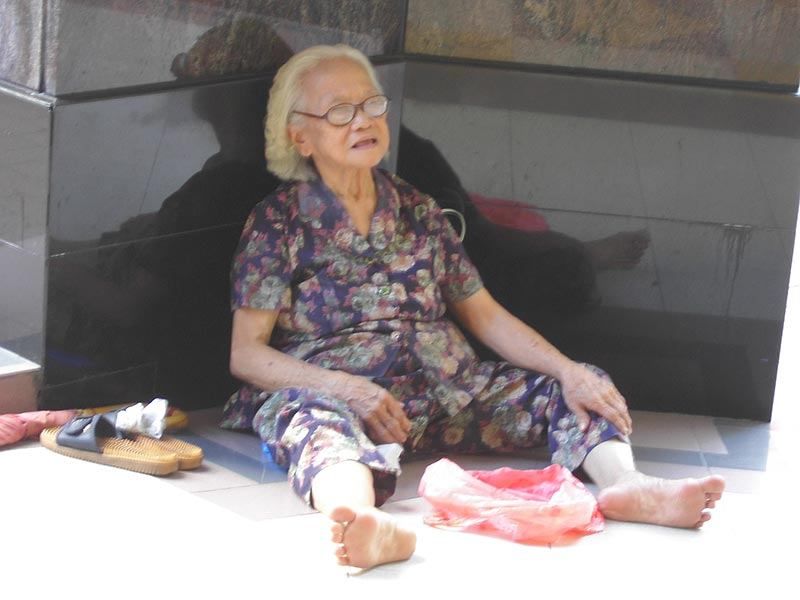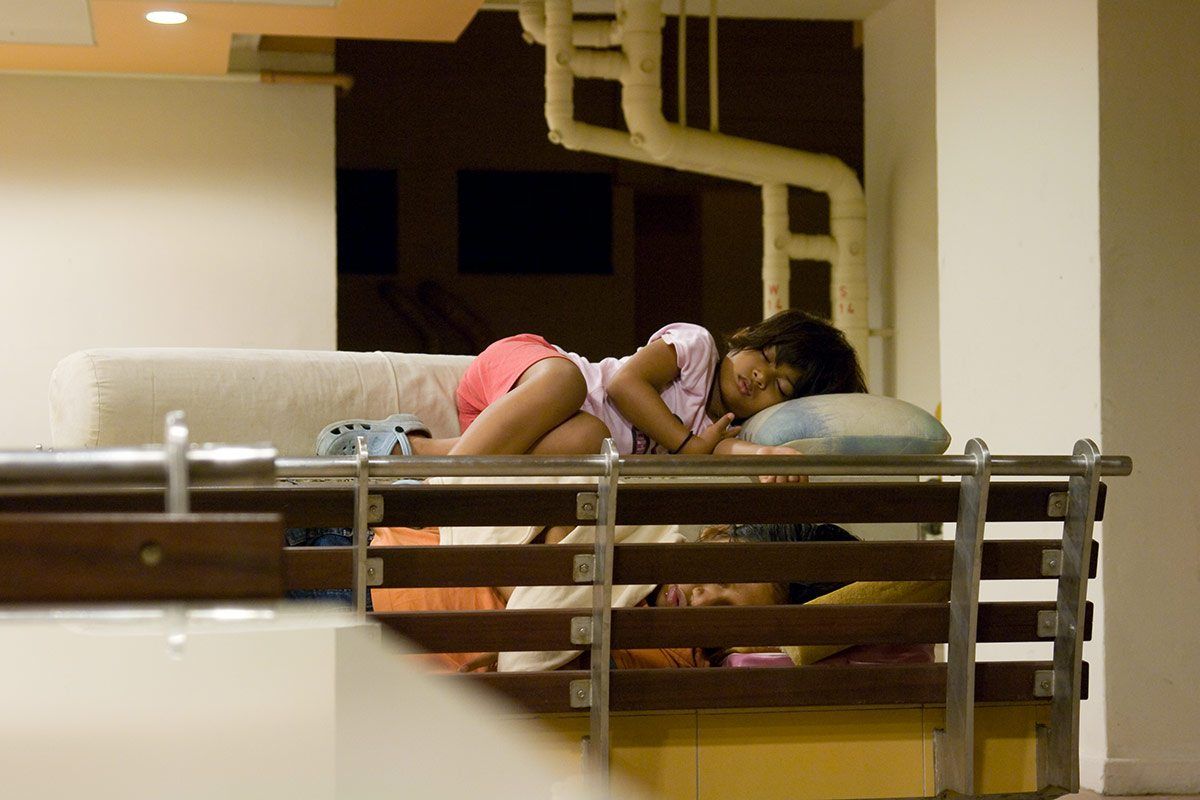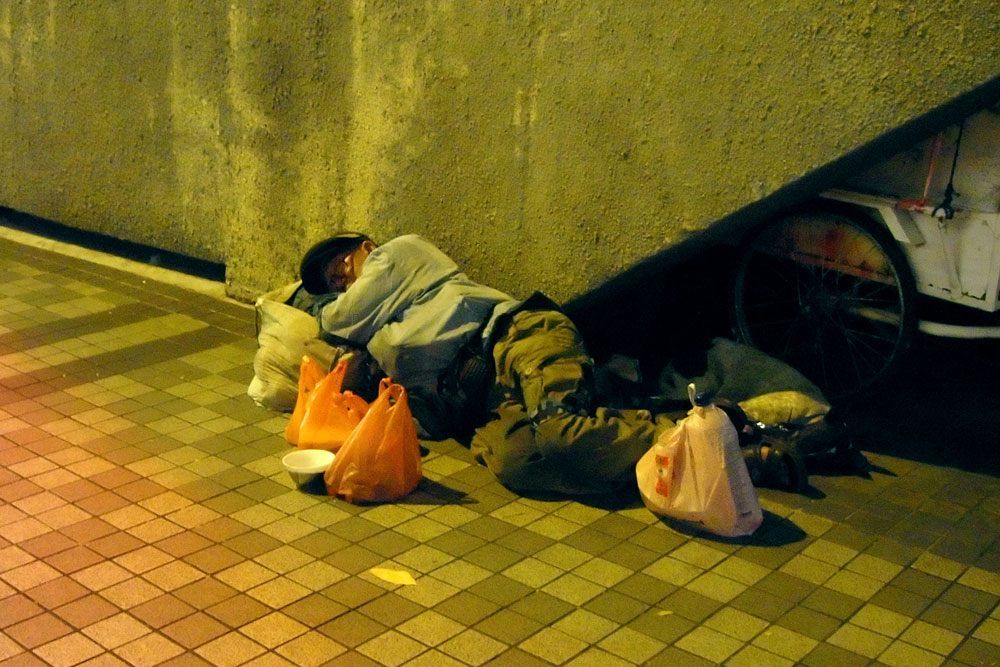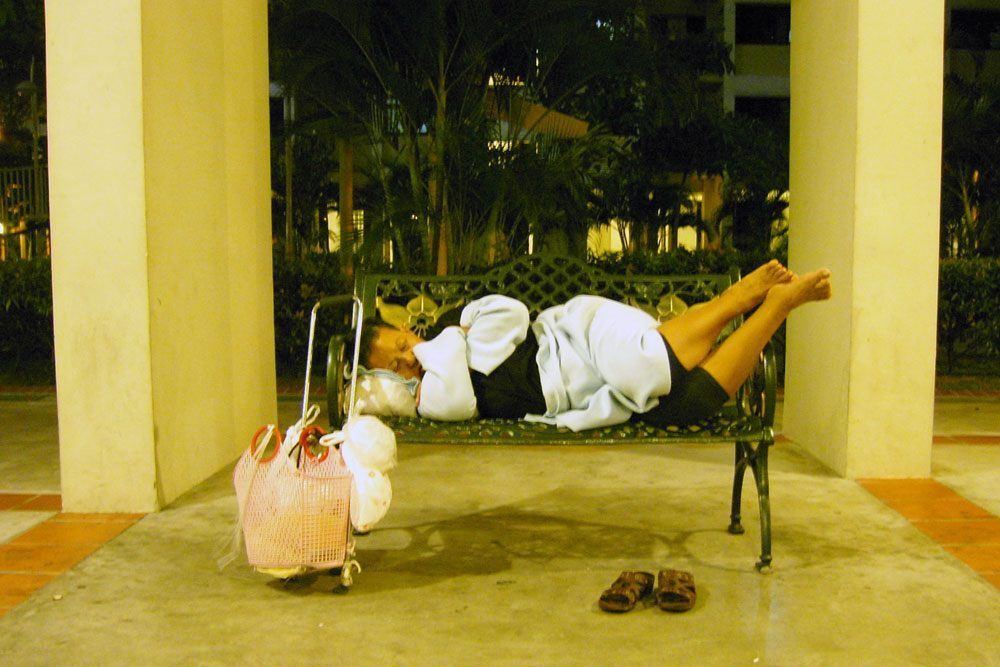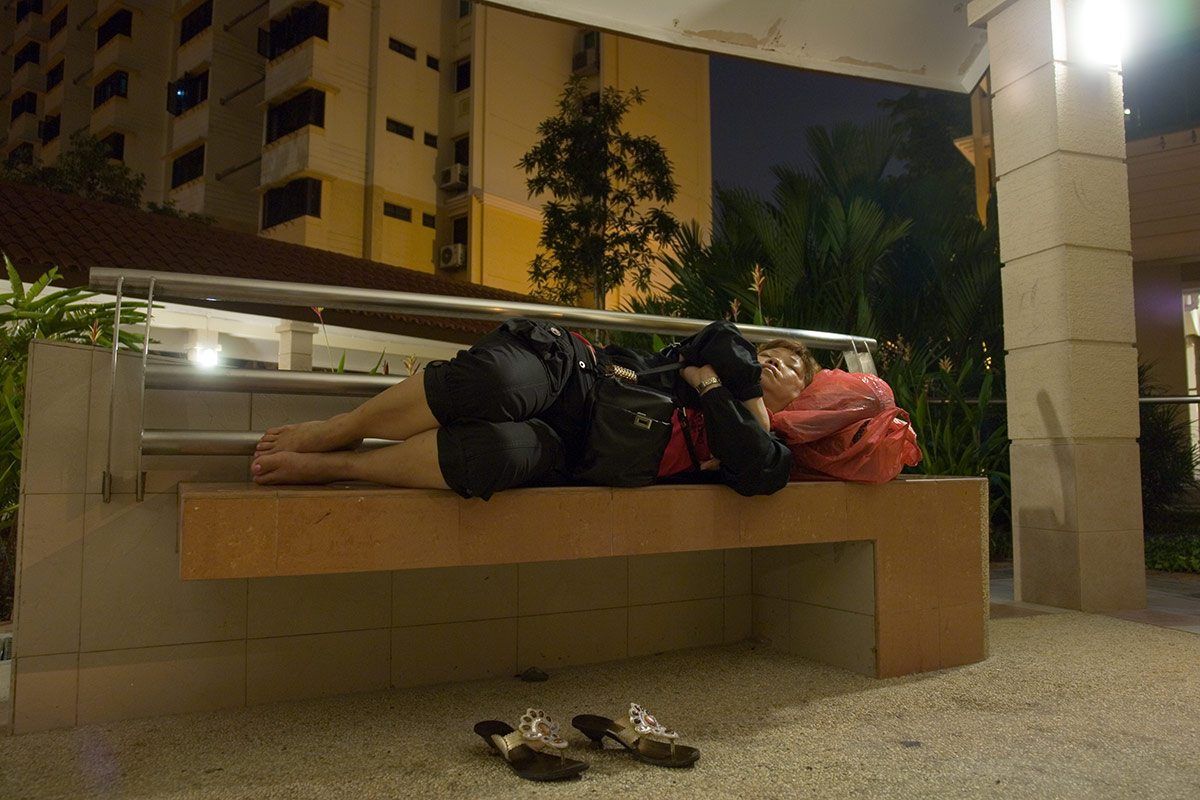S'pore lauded as slum-free city
-
SINGAPORE is the only city in the world without slums, a new report by the United Nations Habitat has found.
The director of UN Habitat's monitoring and research division said the achievement was one that should be studied and, if possible, replicated in other cities.
'There is about 6 per cent slums in more developed countries, so to have zero incidence is an achievement worth celebrating,' said Professor Banji Oyeyinka.
The world organisation released its findings yesterday in cities, including Singapore, to coincide with the 63rd anniversary of the UN.
The report studied factors that contributed to harmonious urbanisation in 245 cities which provided data to UN Habitat.
In Asia, where half the population lives in cities, a third live in slums, the bi-annual State of the World's Cities 2008/2009 report said.
These were defined as areas where there was overcrowding, a lack of safe drinking water, sanitation, durable housing materials and rights over tenure.
Prof Banji said Singapore showed how long-term planning worked to achieve success in slum elimination.
A quarter of Singapore's population lived as squatters or in slums in 1959, with as many as 200 people living in a shophouse before the Government stepped in to build public housing. Over 44,000 flats were ready in 1964.
Asked how much time was necessary for a concerted effort to eliminate slums, Prof Banji said it would depend: 'Just for provision of clean water throughout a city, it would need 10 years of consistently and effectively applied policies.'
For the world to understand the best methods to eliminate such pools of disease and poverty, he invited researchers studying cities to collaborate with UN Habitat. He also invited non-government organisations and universities to send their data.
The Centre for Liveable Cities, Singapore, set up by the National Development Ministry and Ministry for the Environment and Water Resources in June to enhance Singapore's expertise in urban development, is interested in collaboration.
Its director Andrew Tan said: 'We want to learn the best practices of other cities, like Japan's responsible communities, which take care of the cleanliness of their own environment.'
About 50 researchers, analysts and policymakers attended the launch.
The UN Habitat's next report will be released in 2010.
-
They achieved being slum-free over 3 decades ago so what's the big deal?
With such a small land mass its relatively easy to control and clean up the slums; comparing to the land mass like malaysia.
Another one of those lame-arse trophies Sg gets that no one really cares.
-
Originally posted by nullifi3d:
They achieved being slum-free over 3 decades ago so what's the big deal?
With such a small land mass its relatively easy to control and clean up the slums; comparing to the land mass like malaysia.
Another one of those lame-arse trophies Sg gets that no one really cares.
They achieved being slum-free over 3 decades ago so what's the big deal?
wow. shows how capable this govt is able to eradicate slums so fast after independence
With such a small land mass its relatively easy to control and clean up the slums; comparing to the land mass like malaysia
huh...i believe UN Habitat is referring to cities only..
Another one of those lame-arse trophies Sg gets that no one really cares.
hehe....wet blanket....shows lack of understanding that slums may be potential health hazard sites
-
People from the slums are moved to 1-room hdb flats. The problem remains. They are still poor. These 1-room flats are the slums of first class city state.

-

RISE IN NUMBER OF BEGGARS
By Theresa Tan
THE number of beggars and vagrants rounded up by the authorities rose sharply in the first six months of this year, with many being foreigners.
The foreigners, who included bogus monks and nuns and the disabled, were found begging at hawker centres, temples and MRT stations during festive periods.
Most of these foreign beggars come from China, Indonesia, Malaysia and Thailand, the Ministry of Community Development, Youth and Sports (MCYS) told The Straits Times.
In the first half of the year, 181 destitute persons - or beggars and vagrants - were picked up. This is a big increase over previous years, which saw an average of 207 destitute persons rounded up each year from 2005 to 2007.
The MCYS said foreign beggars and vagrants played a 'significant' role in the increase, accounting for 74 of the 181 people picked up. This compares with 51 for the whole of last year, 29 in 2006, and 21 in 2005.
During the Muslim fasting month of Ramadan, MCYS officers see more 'women and elderly men from neighbouring countries' begging outside mosques and in Geylang Serai.
Foreign beggars are a familiar sight outside the Sultan Mosque on Fridays, when it is packed with worshippers, said Ustaz Mohd Khair Rahmat, a mosque manager.
About 10 to 15 beggars, mostly foreigners, will hang around on Fridays and their numbers usually double during Ramadan, he said. Most are from Malaysia and Batam, with some from Pakistan.
Ustaz Mohd Khair added: 'The Pakistani beggars are more aggressive. They will ask you for money, saying they are from some orphanage or madrasah in Pakistan. And if you ignore them, they will keep following you and asking you to give.'
Earlier this year, the Sultan Mosque began telling its congregation that if they wanted to help the poor, they should donate money to the mosque, which would channel it to genuinely needy cases.
On Friday, The Straits Times found over 10 beggars outside the mosque, mostly women. Some had young children in tow. They would not speak to the press.
The MCYS patrols about 16 times a month to pick up vagrants and beggars on the streets of Singapore. It then conducts a 'detailed social investigation' into their background.
Foreign beggars and vagrants are repatriated and blacklisted by the Immigration and Checkpoints Authority.
Local destitutes who are found to be 'homeless, without means and without family support' are sent to a welfare home. There were about 1,790 destitutes living in the 10 welfare homes last month.
It is an offence to beg in Singapore. Those who have at least two previous begging records can be fined up to $3,000 and jailed for up to two years.
Said an MCYS spokesman: 'There is no reason for any needy Singaporean to beg or be a vagrant. If the public detects any person who needs more assistance, they should contact MCYS through the ComCare helpline at 1800-222-0000.'
-
"What profit is there when you gain the world but lose your soul."
When I was living in a kampong, in a ramshackle wooden house, everyone in the kampong knew everyone else. If I did a mischief far from home, steal fruits, damage public property, etc and an elder spot it, he would know who my father is and report it. Any kids lost, the family would immediately know of where the kid is. Kampong folks could take short cut through people houses. We learnt different dialects and languages. There was a hierachy order among us kids. The big kids were the mentors and leaders of the younger kids. We were poor but we celebrate festivals with out neighbours. We also look after stray dogs and cats.
Today, I live in a world acclaimed HDB four room flat. Design and Built posh flat. I don't know my neighbour names, but I do say "hi' and engage in small talk. I see a kid at the void deck, I would not know where he/she is from, or who the parents are. I mind my business, and get easily annoyed by people I don't know. And vice versa. Very little civic consciousness, and no ownership of common areas. "Outside my home is none of my concern, and I don't care about you" this is the current attitude at HDB blocks. All because we worship money.
We can spend tens of millions of dollars to build structures for the benefit of car owners, but cannot "waste money" on the little people who walks and cycle. Build tunnels for vehicular traffic, but not tunnels for pedestrians. Maybe OHPC provide aerobic exercise for the elderly and is good for them.
Yes we have no slum, but somehow we are not proud of our achievements. Not as proud as the FTs or FWs of their own countries, even though they have to come here to earn a living, and win medals.
-
Originally posted by googoomuck:
People from the slums are moved to 1-room hdb flats. The problem remains. They are still poor. These 1-room flats are the slums of first class city state.

It's one thing being poor and another living in an area without proper sanitation, electricity, security and water.
-
When I was living in a kampong, in a ramshackle wooden house, everyone in the kampong knew everyone else. If I did a mischief far from home, steal fruits, damage public property, etc and an elder spot it, he would know who my father is and report it. Any kids lost, the family would immediately know of where the kid is. Kampong folks could take short cut through people houses. We learnt different dialects and languages. There was a hierachy order among us kids. The big kids were the mentors and leaders of the younger kids. We were poor but we celebrate festivals with out neighbours. We also look after stray dogs and cats.
Today, I live in a world acclaimed HDB four room flat. Design and Built posh flat. I don't know my neighbour names, but I do say "hi' and engage in small talk. I see a kid at the void deck, I would not know where he/she is from, or who the parents are. I mind my business, and get easily annoyed by people I don't know. And vice versa. Very little civic consciousness, and no ownership of common areas. "Outside my home is none of my concern, and I don't care about you" this is the current attitude at HDB blocks. All because we worship money.
See:
-
Meet Singapore's nomad families
by Braema Mathi, Senior Writer
For four years, the newly-weds lived on the beach.
From 2003 to 2007, they lived off their catch from the sea, did odd jobs, and washed in public toilets.
At 16, Madam Siti (not her real name), a Primary 4 dropout, married Mr Osman (not his real name), 25, despite parental objections. They were ostracised by both their families.
They lived in a series of pitched tents at Changi, East Coast, then Sembawang beach. When Madam Siti gave birth, her sister and in-laws took them in for a few months before conflicts drove them out to the beach.
This went on till last year.
Madam Siti, now 21, and Mr Osman, now 30, and their two children aged two and five, showed up at the Ministry of Community Development Youth and Sports' Thomson Road headquarters, asking for help to end their nomadic existence.
With rising living costs and property prices, the number of nomadic families is on the rise, according to nine family service centres (FSCs) here. Each of the FSCs says it sees between 10 and 30 such cases each year.
Lakeside FSC counsellor Edwin Quek says: 'We are seeing more cases. The families cannot cope with mortgage loans payments and the cost of living.'
His centre has already received eight calls for help between March and May this year from displaced families, up from one or two cases earlier this year.
Social workers also say they see more families - with one FSC it was one case a month - sleeping at void decks, often with children in tow and showering in public toilets.
This goes on till they are allotted rental flats from the HDB or till they can afford to rent or buy a unit in the open market.
But the wait for an HDB rental unit is now up to 15 months - double the waiting time in 2006. The number of people applying for heavily subsidised HDB rental flats has shot up by at least 30 per cent in the past few months.
Now, there are 4,000 eligible applicants in the queue, waiting for one- and two-room rental units. Depending on household income and other factors, the rents are fixed between $26 and $205 a month for a one-room flat and between $44 and $275 for a two-room unit, a fraction of the market rates.
Fallible family network
According to social workers, most of these transient homeless are divorcees and the down and out.
In some divorce cases, after the matrimonial homes are sold, proceeds split between spouses and creditors paid off, there is often not enough cash or savings left to buy another flat.
Others are caught in a swirl of bad decisions and poor planning, resulting in the banks seizing their flats over unpaid mortgage payments.
The official approach taken in dealing with such families is for social workers at FSCs - as a first option - to encourage homeless families to live with relatives, friends or strangers.
This is also for practical reasons, as relatives often charge less rent - from $150 for a room - compared to the $500 and above that landlords who are strangers charge.
But such arrangements often do not work out. With not just one but several children and boxes of belongings in tow, the goodwill of relatives quickly crumbles under the pressures of living together in a small space.
Social workers cite cases where rules imposed by relatives and landlords - that include no cooking, minimum noise levels and a cap on water usage - are difficult for families to adhere to. Before long, typically no more than a month or two, they are thrown out again or prefer to leave.
When their circle of kin is exhausted, they start living in void decks, beaches, quiet stairwells in commercial buildings, bin centres and out of vans.
'They just want to live on their own, without all the tension of living with others,' said a social worker with 10 years of experience, who declined to be named.
The problem of nomadic families was hotly discussed in Parliament early last year. Ang Mo Kio GRC MP Inderjit Singh noted then that many residents were in negative equity and had defaulted on mortgages, which resulted in repossession of their flats by banks. He asked if these cases were increasing because of the policy change of allowing banks to handle HDB mortgages.
In reply, Dr Mohamad Maliki Osman, Parliamentary Secretary for National Development, said families planning to take up a bank loan should understand the implications of taking on this responsibility.
Each month, about 60 repossessed flats reportedly go on sale. Many of these belong to families which over-extend themselves financially, for example, by buying a bigger flat than they can afford.
'Families often do not manage their budgets well and there is no planning,' said Mr Quek.
Others lose their homes because of sudden illnesses or loss of jobs. Many more are victims of ignorance. They do not know, for example, that the HDB rules include a 30-month waiting period if they have sold their flat bought with certain conditions from the HDB, or that they can apply for another HDB loan or subsidy only subject to conditions, if they have already done so previously.
'They go into this buying and selling of flats without knowing enough about all the policy hitches. They need more guidance,' said Mr Quek.
No room at shelters
The most vulnerable nomads tend to be divorced, lower-income women with children, said Mrs Rachel Lee, a social worker with Fei Yue FSC.
Most landlords are reluctant to take in lone women with children. They wonder if they can pay up and fear getting drawn into their family problems.
'There is also a huge constraint in space as, often, they tend to have a lot of household stuff that they have to take along, besides the children,' she said.
The hardest hit are nomadic children, who need a stable environment but end up on the move all the time, showering in public toilets and witnessing endless family feuds. Many end up skipping school.
Mrs Chua Yen Ching, principal of NorthLight School that caters to students who fail their Primary School Leaving Examination, said: 'It is important for a child to come to school without having such problems as a barrier to his or her learning.'
But there are few long-term solutions in sight.
Singapore currently has only one shelter for displaced families. New Hope Shelter for Displaced Families, run by New Hope Community Services at Yishun, has housed 41 families since it began operations a year ago.
It can accommodate 22 families at any one time. It now has four families on the wait-list - which ranges from 'a few days to weeks, depending on how long it takes current residents to leave', says its centre manager, Mr Ravi Philemon.
Each family can stay up to three months and has to pay $150 a month for utilities and food rations.
There are three other shelters here, meant for battered women. All three - a 40-bedder run by the Good Shepherd Sisters, a 22-bed Star Shelter run by the Singapore Council of Women's Organisations, and a 50-bedder run by the Singapore Anglican Community Services - have taken in homeless families, though they are not equipped to handle children.
Their social workers note that many of the families stay beyond the three months allowed, simply because they cannot afford market rate rentals.
Self-catering shelters?
The HDB has announced that it will build more rental flats, from the current 43,000 units to 50,000, over the next few years. It will also review the eligibility criteria for rental housing to help the 'genuinely poor'.
One way forward, suggests Mr Chua Wei Bin from Ang Mo Kio FSC, is to set up a committee that includes both social workers and HDB officials to better assess options for homeless families.
That way, besides the HDB's eligibility criteria, other issues like family dynamics can be factored in. For example, on paper, a nomadic family may have siblings they can stay with, but they may be estranged or feuding.
Pastor Andrew Khoo of New Hope Community Services, which runs a shelter for the homeless, said that more temporary shelter space will be needed and hopes to raise funds for it.
Associate Professor Ngiam Tee Liang, head of the National University of Singapore's social work department, adds that although the state wants homeless families to seek refuge first with relatives and friends, those who have tried their best but failed to go down that route should not be left out in the cold.
'With close monitoring, genuine families in need must be helped in getting a home,' he said.
Another solution that Mr Gerard Ee, executive director of Beyond Social Services, suggests is to offer a self-catering shelter for families where they manage themselves and their finances on their own.
Once they show that they are capable of moving on, they are given HDB rental units.
'Shelters unfortunately institutionalise dependency. They must be short-term solutions. Families must find their own solutions. This way, we give them that opportunity and also respect their lifestyle, without going into rescue mode,' he said.
The Ministry of Community Development, Youth and Sports placed Madam Siti's family in the New Hope Shelter. They stayed there from June to September last year and were given counselling, budgeting and parenting classes.
Mr Osman, previously a cleaner earning $600 a month, has since landed a higher-paying job with help from the shelter. He is now a car-washer, making $800 a month.
The family now lives with Madam Siti's sister in a one-room flat. They stick to a tight budget worked out by the centre for them - $50 for food, $100 for rental, $100 for transport, the rest for the children.
When Madam Siti turns 21 next month, they will join the queue for an HDB rental flat, forgoing their dreams of buying a flat, as they know they cannot afford it for now and do not wish to get into debt.
'I never want to go back and live at the beach. I want to live in our own house soon and build up our lives,' she said.
This article was first published in The Straits Times on June 22, 2008.
-
Originally posted by Bentsb05:
They achieved being slum-free over 3 decades ago so what's the big deal?
wow. shows how capable this govt is able to eradicate slums so fast after independence
With such a small land mass its relatively easy to control and clean up the slums; comparing to the land mass like malaysia
huh...i believe UN Habitat is referring to cities only..
Another one of those lame-arse trophies Sg gets that no one really cares.
hehe....wet blanket....shows lack of understanding that slums may be potential health hazard sites
How come Oz,USA,UK,etc cannot do it 60 years after WW2?
-
look at the big pictures.No country is perfect.
Dunt quote few extreme cases to belittle achievements of SG housing.
I wander why UN Secretary General Ban did not mention SG as
the only slum free country.
Nvm.We are enjoying the fruits,though not perfect.
http://www.unhabitat.org/content.asp?cid=5964&catid=7&typeid=46&subMenuId=0
http://www.unhabitat.org/content.asp?cid=5979&catid=5&typeid=6&subMenuId=0

http://www.unhabitat.org/content.asp?cid=2483&catid=345&typeid=6&subMenuId=0
wildsingapore news: Singapore gets top marks in UN World's Cities
...
-
Slums are found in hdb flats. look around and you will find some, never ever take time to pack their houses.
-
what's the definition of slums?
-
A slum, as defined by the UN as a run-down area of a city characterized by substandard housing and squalor and lacking in tenure security.
-
so.... there is a minimum standard housing something... what is the minimum standard for it to not be a slum?
-
Breaking News
Republic is a 'carbon sink'SINGAPORE is known to be a carbon sink, absorbing more carbon dioxide than it releases into the atmosphere, said the editor of the United Nations Habitat Report 2008/2009, Ms Rasna Warah.
She said that the city's intense use of greenery with its numerous parks, gardens and nature reserves allowed@@@@@@@@@@@@
we are a green city...
-
Originally posted by Whatdatoot:
A slum, as defined by the UN as a run-down area of a city characterized by substandard housing and squalor and lacking in tenure security.
can u tell me the sources of the report.
-
here's your source:
STOMPer Mark saw this beggar at Bedok MRT station and says the sight of beggars in Singapore disturbs him.
He says:
"They are seen mostly around the MRT vicinity.
"I am greatly perturbed by this.
"This beggar at Bedok MRT station is one who I see several times since Monday.
"Today (September 2) I saw him at 7.45am and when I was on my way back from work I saw him again at 10.30pm.
"I do pray that our society will not be too fast paced that people who can't cope will be left behind to become beggars."There have also been recent reports in the various media touching on how 'professionals' from other countries come to Singapore and work in such begging syndicates.
Do send us pictures and tell us when you see them. -
but we got forest prostitutions and thick skin govt
-
We are worse than other countries
Even the poorest got house, though in poor shape
Our beggar have to roam the streets
Sigh
-
That's why we have policies like increasing GST to help the poor.

-
Originally posted by laurence82:
We are worse than other countries
Even the poorest got house, though in poor shape
Our beggar have to roam the streets
Sigh
You think that beggars from other nation DON'T have to roam the streets? Have you travelled around South east asia before?Hell, did you even know that there is actually beggars in the USA as well?
-
Originally posted by ray245:
You think that beggars from other nation DON'T have to roam the streets? Have you travelled around South east asia before?Hell, did you even know that there is actually beggars in the USA as well?
Nope
I did not say other countries beggars dont have to roam the streets, dont put words into my mouth.
The farce with no-slums that it doesnt mean no poor, and beggars have to be put out onto the streets.
Thats the laughable part
-
Some people here are just as guilty of selecting reading as the MIW themselves. They aren't as discerning as they think they are; they only believe what they want to believe in, to the point where they miss the gist of the UN report and counter it with a poor selection of articles.



